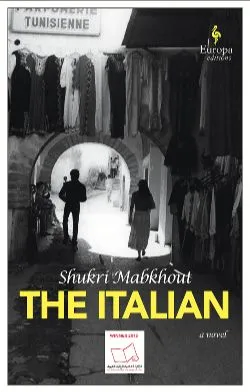
Choukri Mabkhout’s The Italian is an absolutely fascinating novel. It took me some time to get into, but by the time I had finished the first act, I couldn’t really put it down.
The book is effectively a character study of the main character, Abdel Nasser aka “el-Talyani” (“the Italian). The story opens at the end, when–at Abdel Nasser’s father’s funeral–he beats the shit out of his neighbor, who is an imam. The narrator, ostensibly a friend of Abdel Nasser’s and his future wife, attempts to figure out what led to Abdel Nasser scandalizing friends, families, and neighbors through his actions. Naturally, “if you want to make an apple pie from scratch, you must first invent the universe.” So, we go back to his childhood.
As the novel progresses, we become absorbed in Abdel Nasser’s story. In my case, I forgot at times that the narrative even connected back to the events at the funeral. However, Mabkhout does a good job of adding little hints and clues throughout the story to bring our attention back there. It turns the whole novel into a sort of mystery, where we’re trying to figure out which events connect where while discarding any red herrings.
The greatest strength of the novel is that it works on so many different levels: it is about love and romance, it’s a political novel about the transformation of a country, it’s a bildungsroman, and, perhaps more importantly, it’s a (view spoiler) In other words, the book is about trauma in its many guises: familial, romantic, sexual, political, and more.
I was also captivated by the setting. I had read extensively about Tunisia during the colonial period, the early Bourguiba era, and the Revolution. But, this book deals with a moment that I think has not yet been properly discussed in the scholarly literature, especially the Anglophone literature: the transition from Tunisian founding father Habib Bourguiba to Zine el-Abidine Ben Ali, who would be ousted in the 2011 Tunisian Revolution. The bulk of the text spans a few years on either side of November 7th, 1987, and the shift from the second to third act takes place precisely on the night between the 6th and 7th November. We see student battles between Islamists and leftists, police brutality, puerile and dithering “liberalization,” intense corruption, and the challenges of journalism during such an epoch.
Zeina’s character especially resonated with me: I totally understand her tendency to neglect literally every aspect of her life in the hopes of academic achievement. I’ve been there before, and–if I don’t keep it in check–I can also “vanish” from everything in the world out of the need to read, write, and so on.
The weakest component of the book has to be its depiction of gender relations. There’s something of a fantasy in the way that Mabkhout paints them: Abdel Nasser is the sexiest, most handsome man in the world: he can sleep with whoever he wishes. Zeina is the progressive, intellectual Berber warrior with her own problems, Najla the gorgeous volleyball player, Jweeda the MILF next door, Reem the unattainable virgin who can be conquered but must not be. Some of the Arabic language reviews complain that the book is either pornographic or borderline pornographic: it’s not. There’s a lot of sex in the novel, and it at times feels gratuitous, but I think it plays a very important purpose: it connects back to Freud’s compulsion to repeat. The book is about trauma, and many of the characters repeat what is wrong for them over and over again, because they are traumatized but do not even realize how deep the trauma lies. Rather than be bound by the pleasure principle, they seek their own dissolution through Thanatos.
I suspect that I’ll be recommending this book to many people in the future: it’s really quite powerful, remarkably literary, and it holds together quite well.